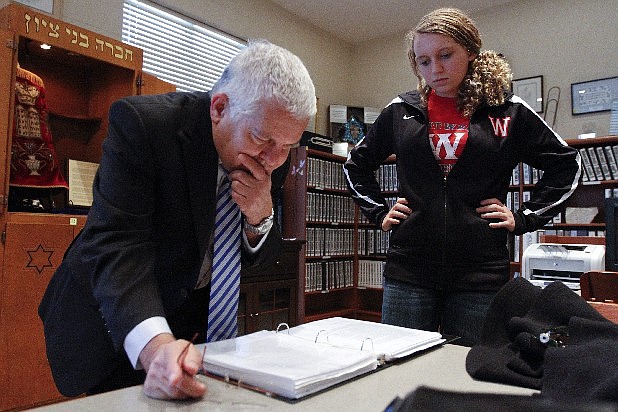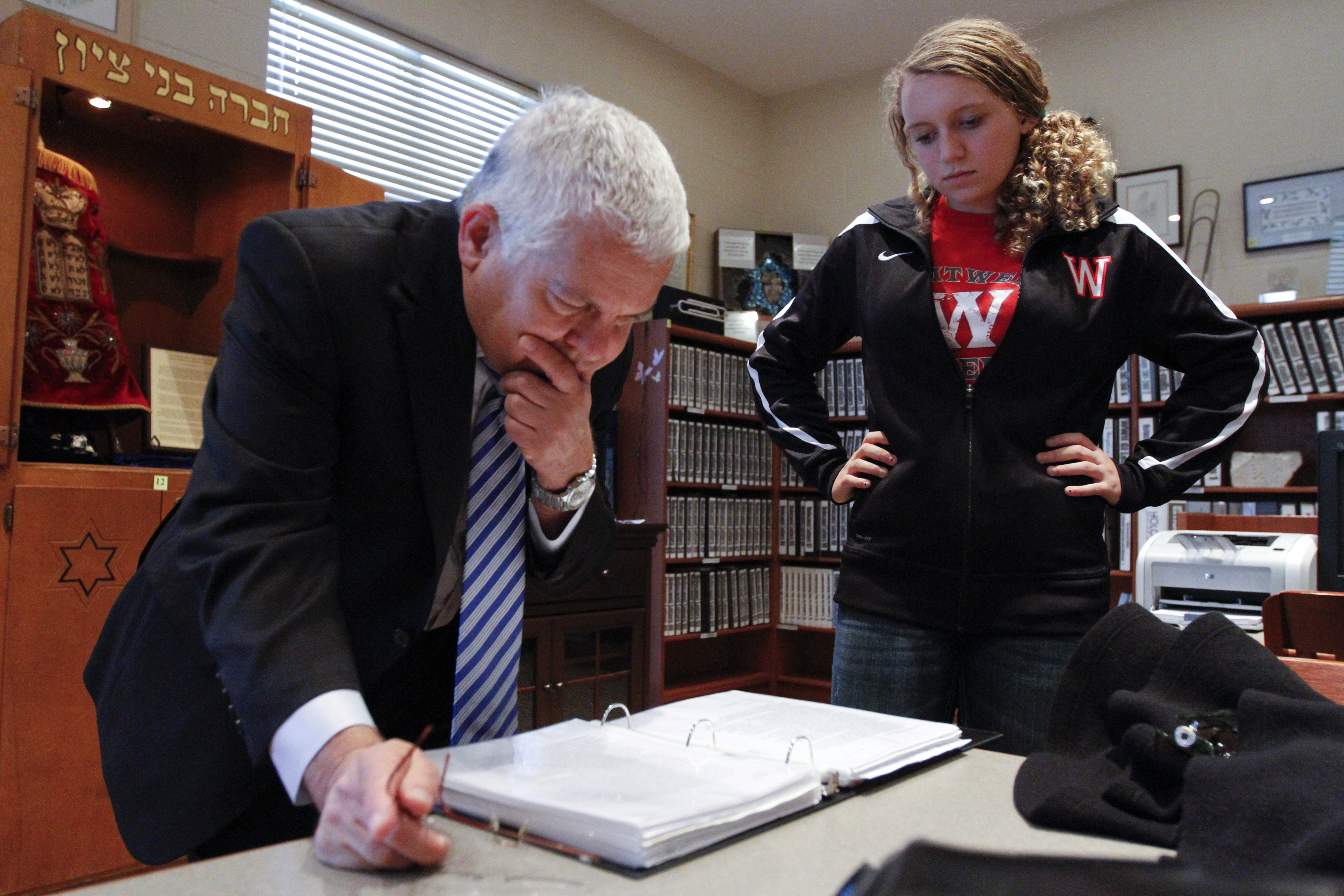What is a Consul General?While each nation has only one ambassador representing it in another country, there may be several consulate offices, which represent the nation to the region where they are located.Israel has nine Consulate General offices in the U.S.Consul General Opher Aviran, whose office is based in Atlanta, represents Israel in six Southeast states, including Tennessee, Georgia and Alabama."The mission of the consulate is to have an impact on the relationship between Israel and the U.S. on multiple levels," Aviran said. "It includes political and national security, business, universities, and culture -- which is the face of a nation."Much of Aviran's work includes business and trade relations between regional and Israeli companies.Aviran also communicates with his district's 12 U.S. senators and 54 congressmen.Other tasks have included nurturing an Israeli-American public safety training program called the Georgia International Law Enforcement Exchange, and forging relationships with Israeli and American art curators and dance companies, among other cultural groups.
At the start of yet another marathon of formal introductions, receptions and handshakes, Opher Aviran took a few moments to pause Thursday morning in the biting cold outside Whitwell Middle School.
Standing in front of an old train car, the Israeli diplomat slowly read the sign on the car's side. The message urged visitors who entered the car to consider the evil that led to millions of Jews and others being hauled off in that train car and others like it to horrific deaths in Nazi concentration camps.
Then Aviran joined a group of eighth-graders and stepped inside.
"It's very cold," he told the students after a few minutes. "It reminds us all the Jews and non-Jews who were taken to concentration camps -- they did not have sweatshirts and coats. They had almost no clothing while in freezing temperatures."
Aviran, who is Israel's consul general for the Southeast, would spend the rest of Thursday bustling around Chattanooga, meeting with mayors, business leaders and university students during his official visit to the city.
But starting the day with a tour of Whitwell's Children's Holocaust Memorial -- led by schoolchildren themselves -- was especially poignant to the diplomat.
"It means especially a lot to me that it is young ones who are guiding us," he said.
The monument has grown out of the school's famed "Paper Clip Project," which was started in 1998 by a Whitwell class as an an effort to visualize the scale of the Holocaust.
Their original intent was to amass 6 million paper clips -- one for each Jew killed during World War II.
Fifteen years and more than 30 million paper clips later, the project has fundamentally altered Whitwell's schools and the surrounding community, says Linda Hooper, a former principal who is now a volunteer with the Children's Holocaust Memorial.
"Our original intent was to introduce our kids to different cultures," Hooper told Aviran. "Roughly 1,600 people live in this community. We're all pretty much cut from the same cloth, all white, and we can pretty much all say we subscribe to the Baptist faith. ... The Holocaust never hit home with us until we began this project."
The project has garnered the town global exposure. The subsequent donation of the train car, where the paper clips are held, and a 2004 documentary only magnified the attention.
The school stopped counting paper clip donations after 30 million, but they still show up in the mail.
The school's eighth-graders carry on the legacy, giving tours of the train car and the school's burgeoning Holocaust museum, which boasts donations from all over the world.
While the memorial has drawn international visitors, Hooper said Aviran's visit was the first by an Israeli dignitary.
The middle-schoolers were mainly shy as Aviran asked them questions, but they rattled off facts about exhibits like donated sculptures, to letters of apology to Anne Frank written by a group of German schoolchildren.
"It really bothered me, and I got passionate about it," eighth-grader Lyndie Alexander told Aviran, describing when she learned about the Holocaust. "When I had this opportunity to give tours, I wanted to do it."
Many Holocaust survivors and relatives of victims have reached out to the school to offer support. That includes Sylvia Wygoda, a Soddy-Daisy resident and daughter of Hermann Wygoda -- a Polish Jew who lost his wife and children in concentration camps, but fought against the Nazis and eventually settled in the U.S., remarried and had more children.
Wygoda, the former executive director of Georgia's Holocaust Commission, had been to the school many times and helped arrange Aviran's visit. But Thursday was freshly emotional for her.
"There are those of us ... whose families were in this car for the last time before they died," she told the students.
Wygoda shed tears as Aviran presented her with a plaque for trees that were being planted in Israel in her and her family's honor, and she thanked him on behalf of the family she never knew.
Aviran's own family did not face the Holocaust, as his father immigrated from Poland to Palestine before the war began. But he told students the project is a crucial memorial and a lesson in tolerance.
"We must always try to resolve conflict and disputes by talking with one another," he told the students, warning about how simple discord can swell to extreme violence. "You'll be businessmen, businesswomen, politicians, teachers, philosophers. But you must always carry that responsibility to be good people."
•••
Aviran has crisscrossed global borders for more than 30 years serving in diplomatic roles in Burma, the Netherlands and Australia.
But so far, he says, working in the Southeast has been his favorite assignment.
"We're used to saying, 'We're sacrificing for the nation.' It is such a sacrifice to visit Nashville and hear the great country music," he said, laughing. "It's sheer sacrifice to go to Memphis and hear the blues."
In the car on the way to Whitwell, Aviran described the many hats he wears in his job, building bridges between businesses, politicians, universities, artists and religious leaders.
Last week, for example, he was invited to address the South Carolina Baptist convention.
"I started out my speech with just saying 'Y'all.' Everyone loved it," Aviran said. "Coming from Israel, I generally say I am coming from 'the Bible land to the Bible Belt.' We feel the connection. We feel the waves of warmth and support for Israel across churches and schools and political leaders."
That support is key as he talks to local U.S. senators and representatives about political concerns he has, including current negotiations to potentially ease strict sanctions against Iran -- a proposal strongly opposed by Israeli authorities, who do not trust that Iran will curb its nuclear program.
"It is a very dangerous regime," said Aviran, calling Iran the biggest threat "not just for Israel but for the Arab world."
"Today they are trying to talk nicely, and to try not to be seen as dealing with terrorism," he said. "But their centrifuges have not stopped running faster and faster for one moment since their new president Rouhani came into power and gave all these nice speeches."
While Aviran says he hashes out these issues with regional political leaders, he "doesn't have to preach too much" because they generally hold the same views.
U.S. Sen. Bob Corker, R-Chattanooga, appeared on NBC's "Meet the Press" on Sunday to say he was worried the U.S. could "deal away the leverage" it has in negotiations with Iran if sanctions are lifted too early.
Instead of easing sanctions, Aviran and other Israeli officials have urged heavier sanctions to pressure Iran to stop its nuclear activity.
"We want a diplomatic solution, but we're not giving up until we see a change in behavior -- which we have not seen," he said.
•••
Besides Aviran's political and business dealings, a key part of his job is encouraging Holocaust education.
So his tour through Chattanooga ended in an echo of how it started, at the University at Tennessee Fine Arts Center on Thursday night, for a "Visas for Life" Holocaust exhibit reception.
The display honors 10 diplomats across the globe who risked their lives to grant visas to Jews so they could escape Nazi atrocities.
The locations and backstories of the overlooked heroes of those deemed "Righteous Among the Nations" were peculiar, as many -- like Chiune Sugihara, who stamped visas from his train bound for Tokyo -- seemed like unlikely candidates to step up.
Aviran said this altruism is the message the modern generation must learn from the Holocaust, that doing the right thing knows no location or time.
Even Aviran's 17-year-old daughter, who grew up in Israel, told him she was deeply moved upon meeting a Holocaust survivor in Atlanta, learning harrowing details of the Holocaust that she had not heard before.
"You have to take your own team, your own faculty, your own school, and remind ourselves what we know as adults," he said.
"We have to educate ourselves in order to avoid these tragedies."
Staff writer Jeff LaFave contributed to this report.
Contact staff writer Kate Harrison at kharrison@timesfreepress.com or 423-757-6673.

